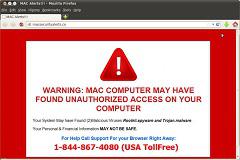What You Should Know About Tech Support Scams
Posted by: Timothy Weaver on 10/26/2015 09:28 AM
[
 Comments
]
Comments
]
Tech support scams are gaining momentum recently. They usually come in the form of cold calls, pop up messages and/or incorrect search engine results.
 The cold call comes from a tech stating he is from a reputable source and has found malware on your system. They ask permission to install remote desktop software under the pretext of removing the infestation. If someone falls for the scam , the tech will either install malware or ask that you pay a fee to remove the "malware."
The cold call comes from a tech stating he is from a reputable source and has found malware on your system. They ask permission to install remote desktop software under the pretext of removing the infestation. If someone falls for the scam , the tech will either install malware or ask that you pay a fee to remove the "malware."
Pop-up warnings occur when a user is browsing the Internet. Again, as with the cold call, the pop up will inform the user that malware has been detected on the computer and they are given a phone number to call. From there it is the same as the cold call with the "tech" either installing malware and/or asking for payment to remove the "malware."
Incorrect search engine results can lead the user to an unsafe site where one is again directed to a tech scam. Drive by malware may be installed from these sites which then usually result in a pop up scam.
The main purpose of these scams is to extort money or infect the computer with either a keylogger or backdoor Trojans in order to gain access to personal information.
If you have been scammed, there are important things to do to protect yourself.
Change all passwords using a different computer.
Run a full anti-virus scan.
Contact your bank and credit card companies.
File a complaint with the appropriate anti-fraud bureau:
USA - Federal Trade Commission (FTC)
Canada - Canadian Anti-Fraud Centre
UK - National Fraud and Cyber Crime Reporting Centre; unsolicited calls.
Source: Norton
 The cold call comes from a tech stating he is from a reputable source and has found malware on your system. They ask permission to install remote desktop software under the pretext of removing the infestation. If someone falls for the scam , the tech will either install malware or ask that you pay a fee to remove the "malware."
The cold call comes from a tech stating he is from a reputable source and has found malware on your system. They ask permission to install remote desktop software under the pretext of removing the infestation. If someone falls for the scam , the tech will either install malware or ask that you pay a fee to remove the "malware." Pop-up warnings occur when a user is browsing the Internet. Again, as with the cold call, the pop up will inform the user that malware has been detected on the computer and they are given a phone number to call. From there it is the same as the cold call with the "tech" either installing malware and/or asking for payment to remove the "malware."
Incorrect search engine results can lead the user to an unsafe site where one is again directed to a tech scam. Drive by malware may be installed from these sites which then usually result in a pop up scam.
The main purpose of these scams is to extort money or infect the computer with either a keylogger or backdoor Trojans in order to gain access to personal information.
If you have been scammed, there are important things to do to protect yourself.
Change all passwords using a different computer.
Run a full anti-virus scan.
Contact your bank and credit card companies.
File a complaint with the appropriate anti-fraud bureau:
USA - Federal Trade Commission (FTC)
Canada - Canadian Anti-Fraud Centre
UK - National Fraud and Cyber Crime Reporting Centre; unsolicited calls.
Source: Norton
Comments






